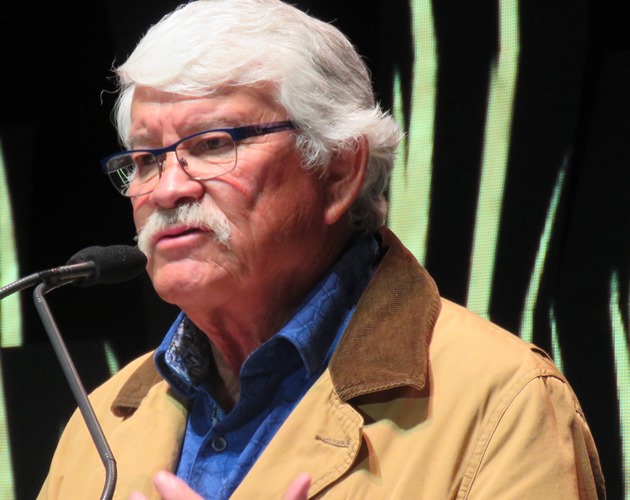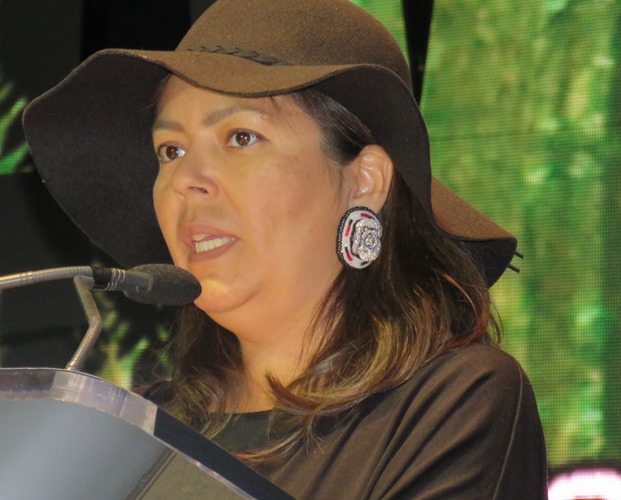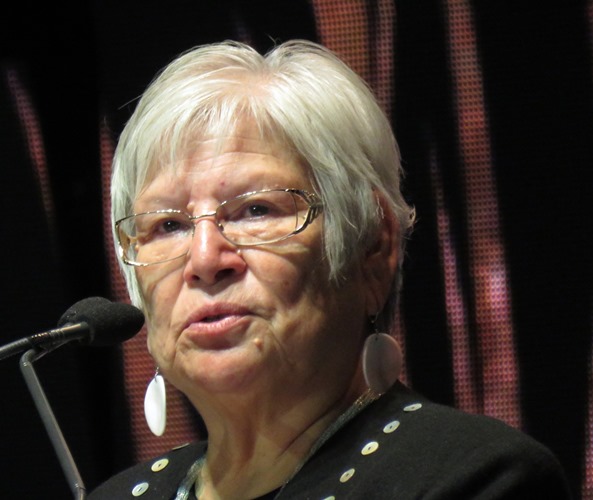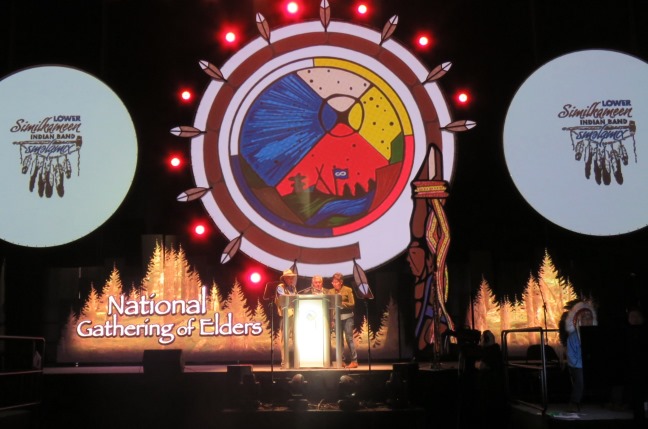By John Copley
(ANNews) – This final segment of a three-piece article on the September 11-14, 2017 National Gathering of Elders (NGE) visits the final three topics (Revitalization of Language and Culture; Missing and Murdered Indigenous Women and Girls; Indigenous Health) of the five that were discussed during the four-day event. Last month comments and observations were made by keynote speakers Alexis Nakota Sioux Nation Chief Tony Alexis (Reconciliation) and AFN Manitoba Regional chief Kevin Hart (Climate Change).
The September and October issues of Alberta Native News introduced our readers to a number of well-known speakers and leaders from the three Indigenous communities, who along with Edmonton mayor Don Iveson, INAC Regional Director General Jim Sisson, and Alberta Indigenous Relations Minister Richard Feehan offered welcoming remarks and insight into the roles each is playing to enhance Indigenous languages, lifestyles, culture and overall well-being.
The NGE was a first-ever national symposium that brought nearly 5,000 Elders from First Nations, Métis and Inuit communities across Canada to Alberta’s capital to talk about and come up with strategies to deal with the numerous issues and concerns that Indigenous peoples face as we move together into the future.
Métis Elder Elmer Ghostkeeper began his keynote address on the Revitalization of Culture and Language by applauding the full room of participants who’d gathered to participate, listen, learn, offer their stories and share their experiences. He thanked his fellow panelists, Elmer Courchene (FN) and Goota Desmarais (Inuit) before discussing the importance of retaining languages and cultural values. He noted that several “University of Alberta students participated in the session, taking notes and summarizing the day’s activities,” though “as was customary during the time I taught at the university, I did make a few changes in each of the areas we discussed: stories, teachings, lessons, reflection and guidance.”

Metis Elder Elmer Ghostkeeper was a member of the Revitalization of Culture and Language Panel.
Elder Ghostkeeper spoke at length on culture, noting that in the early days no one knew what culture was or even what the word meant.
“It is an important word, not an Indigenous word but one that we have adopted,” he said. “I’ve spent 27 years at the university talking about and studying culture and today I am still a student of culture. Culture means to cultivate or to work with the land. Our belief is that we are the land, we are nature, we are the environment; we are not external to it. We breathe the air, we drink the water, we eat the food and we generate heat. At its most basic level of meaning, culture is your beliefs and they in turn become your values and from that you create your behaviours and your relationship (to the land.”
He spoke about the difficulties experienced by Indigenous people today to maintain and strengthen languages and cultures because of the predominately spoken English language and the many text books and other material that are only available in the English language.
He said,
“It is our hope to one day see all of our Indigenous languages available but it is important not to forget that our language is in us; it is a part of us all and we have to learn to allow the speaker within us to speak the language – we need to allow words to come from the heart. We need our language experts to come together to ensure the languages are spoken correctly.”
Elder Ghostkeeper noted that in recent months there has been an increase in funding for $5 to $15 million to help revitalize Indigenous languages.
“To this challenge, however,” he noted, “money is irrelevant.
“We should not depend on money to continue to speak our languages and practice our cultures. We have a fundamental, inherent human right to our language.”
He went on to speak about the Canadian Constitution and in particular Section 35, “which is stand-alone from Sections 91 (federal powers) and 92 (provincial powers) in that Section 35 (Aboriginal powers) cannot be overruled” by the other two. He spoke about his early years as a Métis leader in Alberta and his conversations with former Alberta premier Peter Lougheed and former Prime Minister Pierre Trudeau and how through them he came to realize that “the Crown does not own your children – you do and as such, in my view, the Crown has no legitimacy in apprehending your children.
“The purpose and function of the Residential Schools was to take the language out of the child and replace it with English and by doing that they also took the culture. Language and culture are two sides of the same coin; when one is taken away, the other disappears.”
Elder Ghostkeeper spoke at length on the subject of Indigenous language and the significance of the spoken word, words that don’t always have a simple meaning but often encode important lessons about life, liberty, responsibility, reasoning and function. He spoke about the words of the ancestors, the stories they told and the songs they sang – stories and songs that parents and grandparents still tell today; stories and songs that deliver powerful messages that must continue to be told if Indigenous culture and tradition is to survive and thrive in the next millennia.
He noted that one day the three Indigenous communities would like to see their languages taught in the schools but, cautioned Elder Ghostkeeper, “we must be a part of that solution because they are our languages and our cultures; our stories and our songs and we must be the ones to tell them. We need to be involved when it comes time to include Indigenous languages in our schools. We need to be included whenever decisions are to be made about things that concern us and/or will have an impact on us and our cultures.”

Tanya Kappo was the Keynote Speaker for the panel focused on Missing and Murdered Indigenous Women.
The forum on Missing and Murdered Aboriginal Women and Girls included Gwen Point (FN), Muriel Stanley-Venne (Métis) and Charlotte Wolfery (Inuit); the keynote speaker on the forum was Tanya Kappo, a Treaty 8 First Nations employee who provides advisory assistance and support. A graduate of the Faculty of Law at the University of Manitoba, Kappo also completed International Law at the Rothberg International School at the Hebrew University of Jerusalem. She is also a practicing lawyer who specializes in representing Indian Residential School survivors.
Participating in the forum, Kappo wanted to find the answers to key questions and noted that though her comments and findings are nowhere near comprehensive, she wanted to get a sense of what has to be done to bring peace-of-mind, understanding and healing to families and survivors who live with the “tragic reality” of missing and murdered family members.
“How can we better support our communities?” she asked. “What do you need from us other than resources and changes in laws? What can we do to help support you each and every day? How can we bring solutions and support for families and survivors? How can we support our Elders?
“I feel a lot of sadness from the Elders, many of whom feel almost helpless because everyone sees what’s going on and everyone knows the problems that exist and they have the answers – but why is no one listening?”
The first question presented to the forum participants was “what comes to mind when you hear about missing and murdered Aboriginal women? The answers were varied and straight forward. Some people shared information (about their personal losses and experiences) and asked whether or not Inquiries really worked; others noted that Indigenous women are often victimized by outsiders (non-Indigenous people); another said Aboriginal women are at risk as soon as they are born and that no one is immune, not even honour students or athletes.
“There seems to be an idea or stigma out there that this tragedy only befalls our Aboriginal sisters who live a certain lifestyle – and that’s really not fair and definitely not true,” she said pointedly.
“Equating death and disappearance to a particular lifestyle is degrading and stigmatizing and marginalizes this issue even further than it already is.”
Kappo noted ‘that it all comes back to the question about what needs to be done to create the awareness needed to eliminate this stigma.”
Communication and conversation, she noted, needs to begin taking place throughout Canadian society and with those suffering as victims. It was also determined that more consideration about the impacts of residential schools needs to be addressed. Answers need to be found as to why Aboriginal women and girls run away from their homes, their communities.
“We also have to be aware of the traditional and institutional precedents that have been set by [government entities] such as the Child Welfare and Justice sectors, institutions that constantly work against us,” she said.
“Survivors of attempted murder need a voice, as do the families of survivors of missing and murdered women,” noted Kappo.
“We need to talk to women and girls who have survived the violence and learn what saved them from that situation? What support do they have? What supports didn’t they have and what more should we be thinking about and looking at a little bit more?”
Another topic that arose during the forum was concern for the safety of women and men being released from jail.
“Women – and men – being released from prison need to be delivered to a safe place. When our people are being released after a period of incarceration they are often just dropped off on the street and at no particular time of day,” she said. “They often have no one to talk to, no one to greet them, no outside support and no resources; this is not a safe situation.”
Kappo addressed many issues during her keynote comments and noted that celebrating and recognizing Elders was another topic that arose during the forum.
“Many people feel that there should be an Elder sitting on the MMIW Inquiry, and that we should be talking openly about sexual abuse; it’s going to be hard work, dark and painful work and that goes back to the importance of ceremony and the work that it does” to help the healing process.
When the subject comes to “healing our communities,” noted Kappo, “the overwhelming response throughout the day was that ceremony and family & community belonging is a very important element. Forum participants strongly believed “that ceremony is one of the surest ways to help because it involves family and community,” the two strongest components to well-being.
The last of the five forums held during the NGE event was Indigenous Health, hosted by panel members Dr. Reg Crowshoe (FN), Lorraine Deschambeau (Métis) and Susan Peffer (Inuit). Keynote speaker Marilyn Buffalo, the Indigenous Cultural Advisor at the University of Alberta, offered the keynote address.

UA Indigenous Cultural Adviser Marilyn Buffalo led the panel on Indigenous Health.
“It is important to note,” began Buffalo, “that with all of the conversation that’s been going on and all the political promises that have been made about Nation-to-Nation discussions, the one thing that has to be on that agenda is a discussion about treaty rights when it comes to health. We believe that our treaty rights to health have not been frozen in time and that these rights must be interpreted into meaningful language, present day language so that everyone understands. First Nation Elders are still proactive when it comes to health; they continue their healing practices and it is time the government of this country understand that they have an obligation (to honour treaty rights). We must remind the Canadian government and the federal, provincial and territorial leaders that our rights to health are entrenched in Section 35 of the Canadian Constitution. Those discussions took place in 1982 – coincidentally the same year that the last National Elders conference took place in Ottawa.
“Elders, we have been quiet for too long and in this process, we have lost and we now have a lot of work to do. Never be afraid to speak out. I remember a lesson from my father; he was a Korean War veteran and he told me: ‘they might think they are big shots but they are no different than you or I because just like us, they put their pants on one leg at a time.
“We must also make certain that they know when we approach them for shelter and funding for housing, which affects our health and well-being – all of you Elders are entitled to that and it is covered in Article 25 of the Universal Declaration on Human Rights at the United Nations.
“Everyone has the right to a standard of living that gives them adequate health (coverage) and well-being of themselves and their families and that includes food, housing, clothing, medical care and the necessary access to social services and the right to security in the event of unemployment, sickness, disability, old age, widowhood, and other lack of livelihood because of circumstances beyond control.
“Canada also talks about having endorsed the UN Declaration of the Rights of Indigenous Peoples. This declaration was made a decade ago but not one section of those declarations has yet been implemented by the Government of Canada.”
Buffalo continued by urging the Elders and others in attendance to “go to the internet, or have your children download a hard copy of the Declaration for your reference and use.”
A powerpoint presentation followed in which she discussed the challenges and the thoughts of forum participants.
“First,” she noted,
“Indigenous people are not treated in the same way as the mainstream population; health care services are based on funding and policies versus actual need. Indigenous people are faced with poor health care staffing and training opportunities. Because of the assimilation process instilled through the residential school system we have lost much and we have experienced very hard times as a result of drugs, alcohol and poverty.
“And finally, if you live on a reserve or a Métis settlement you are often denied appropriate care dues to budgetary constraints. The legal battle of who pays for what is ongoing and degrading; we call it the ping-pong effect.”
Buffalo spoke about Indigenous medicines and western medicines, noting that “my Elder taught me in Cree that my pharmacy and healing is in the forest and on the land. Anything I want to eat, medicines, fruits, meat – they are on the land and it my job to go and find them. There needs to be the inclusion of the Indigenous Cycle of Life and the traditional methods, including healing ceremonies. There are two systems: one is western where the information flow is written data, messages, policies and reports. The other is Indigenous and we have to begin working together with our young people to help support that bridging of the gaps and by integrating our own oral culture and ceremony into these western organizations.
“The medical community, the university professors, the school teachers all need to become more knowledgeable when it comes to Indigenous issues and jurisdictional problems. These western organizations would be better off by ensuring that (qualified) Aboriginal people are on their boards, in their schools and on their health care systems.”
Buffalo closed by noting that though times are difficult and progress is slow, perseverance is essential, as is the continued determination and willingness to speak out and to make sure that no government or health system, forces their policies on Indigenous peoples whose inherent and treaty rights supersede that of a departmental determination developed to separate Indigenous Canadians from those rights.
“We have a young population,” noted Buffalo, “and if we want to keep our families healthy it is up to us to learn the traditional methods of midwifery and maternal health care.
“We need to be very aggressive in asserting our rights and demand to have clean running water in every Indigenous community – north, south, east and west. We need to have community-based support for our young families and as our Elders say: no more blaming, no more pointing fingers.
“We have to step up and do what is right by taking care of our relatives, our families and our communities. As Elders we have to take our powers back because we are the teachers; we are the knowledge keepers. Do what you can to share your heart and no more bickering between ourselves – in other words remember that First Nation, Métis, Inuit – we are all the same people.”




Be the first to comment on "National Gathering of Elders delivers important messages: Part III"